Olympic star Lydia Valentín weighs in on doping
The Spanish weightlifting champion has spent years being pipped at the post by rivals on performance-enhancing drugs. But a crusade in 2016 retrospectively disqualified a number of athletes and today, she boasts Olympic gold, silver and bronze – making her a role model for minority sports in Spain
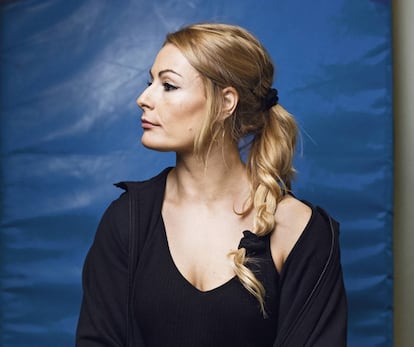
In 1992, while Barcelona was inaugurating its Olympic stadiums, a somewhat more modest sports pavilion was being opened on the far side of Spain, in a Ponferrada satellite town called Camponaraya, in the province of Léon. Like the President of the International Olympic Committee (IOC) Juan Antonio Samaranch, Camponaraya’s mayor, Antonio Canedo, was keen to transform his hometown through sport. And having built the stadium, he put Isaac Álvarez, a weightlifting coach like Canedo himself, at the helm. Add to this mix a young local girl called Lydia Valentín, who was itching to flex her athletic muscles. “I met her when she was just seven years old,” says Álvarez. “She was naturally gifted and had exceptional qualities. She was outstanding in gymnastics and was spectacular at basketball. She was very coordinated with great potential. She was far better than everyone else.”
Agile and competitive, Lydia had a breathtaking aptitude and attitude. “I was the fastest runner, the best jumper,” she recalls. “By the time I was 11, I competed with the boys because the girls were no longer rivals.” At 11, Álvarez suggested she take up weightlifting and she happened to like it. “The idea was that she would stand out internationally,” he says. “I was certain she would succeed. At 14, she was able to compete and she was declared champion of Spain twice in a row.” From then on, the Spanish Weightlifting Federation, which now has 2,571 male and female members, began to take note.
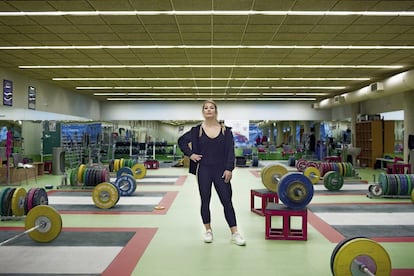
“I remember my parents meeting in the living room with the coach and the president of the Federation. We lived in a duplex and I was upstairs, eavesdropping. It was my dream to be selected and before I knew it I was shouting down to my mother, ‘Mom, buy me a suitcase! I’m going!’” Lydia’s family thought long and hard before they let their 15-year-old middle child sign up for the National Sports Council’s High Performance Center (CAR) and move 400 kilometers to Madrid to board at the Joaquín Blume Residence. “My parents weren’t selfish,” says Valentín. “They had my best interests at heart. They could see I was so excited and sure and ready… They thought it might be my only chance.”
At 33, almost 20 years later, Valentín is a sporting icon and the best female weightlifter ever to have come out of Spain. She has been European Champion four times – once more than Estefanía Juan, who was the reigning champion until Valentín burst onto the scene. She has also won Olympic gold and the World Championships, something no other Spanish weightlifter, male or female, has ever done.
All my life I have competed against people who don’t play by the rules Weightlifting star Lydia Valentín
At the CAR, close to the Moncloa Palace where the Spanish Government has its headquarters, Spanish athletes of all descriptions are busy busting a gut to get to the top of their particular discipline. The weightlifting gym is in a basement where Lydia, who competes in the Women’s 75 kilogram category, has spent literally half her life. It is a rectangular green-hued space, surrounded by mirrors and photos of Spain’s most successful weightlifters. There, wearing make up and black gym clothes, Valentín turns her neck constantly to release any tension as if she was about to lift 115 kilograms in a “snatch” or 135 in a “clean and jerk” – the first of these techniques consists of lifting the barbell above the head in one movement and the latter of steadying of the barbell just below chest level before raising it above the head. These are the weights that recently won Lydia the European Championship in Bucharest – gold in each category and hence gold in the so-called Olympic total, which in this case amounts to 250 kilograms. This evening, Lydia has one eye on her cellphone, which she apologizes for. Atlético Madrid is playing Arsenal in the Wanda Metropolitano stadium in the semi-finals of the UEFA European League, and she has plans.
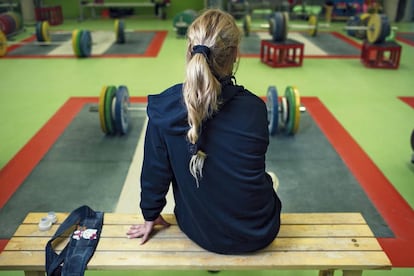
Lydia laughs when she remembers the day she arrived at CAR all those years ago. “It was an incredible change,” she says. “I was used to training for an hour a day and here it was a number of hours a day and also high school. It killed me. I couldn’t believe it.” Not everyone stayed the course, but Lydia was determined to follow her dream and never complained, however tired she felt. Valentín’s coach, Matías Fernández, who has accompanied her throughout her career and is perhaps the person who knows her best outside her family, is all too aware of the difficulty of finding talented weightlifters like her who will go the distance in this minority sport that offers little in the way of fame or money. According to Lydia, you have to be 100% sure about competing because at some point you have to drop your studies. You can’t do both. And competition at this level means constant pressure and the risk an injury could end your career, not to mention the economic considerations. Thirty-six-year-old Estefanía Juan, who was thrice European Champion, explains that once she had got to the top, the grants were just enough to survive on. Juan is now a crossfit and weightlifting coach.
Estefanía was the first person to welcome Valentín at the CAR gym when she arrived as a young girl. The pair had first met in Camponaraya during a tournament. “She was very strong and blond and she had a lot of Hello Kitty clips in her hair,” recalls Juan. Valentín has made Hello Kitty part of her image, but her perseverance and ability to always take things one step further is what really defines her, according to Matías Fernández. Irene Martínez, bronze medalist in the 63 kilogram category in the last European Championships and eight years younger than Valentín, says Valentín is her inspiration. “Her technique and physique are very good,” she says. “But the main thing is her perseverance. She totally believes in herself. Her mind is her biggest asset.”
The Spanish government spends €900,000 on support – a pittance compared to the €10 million invested by Kazakhstan
Olympic glory came in an unexpected manner in 2016. Not only did she pick up bronze in Rio, but a number of doping cases had come to light pertaining to the 2008 Beijing Games and the 2012 London Games. Days before she competed in Rio, the International Olympic Committee stated that the first three winners in the 75-kilogram category at the London Olympics had been disqualified. As Valentín had come fourth, she was consequently promoted to gold, though she doesn’t yet have the medal as the cases against disqualified athletes Svetlana Podobedova (Kazakhstan), Natalia Zabolotnaya (Russia) and Iryna Kulesha (Belarus) have not yet wrapped up. Just after the Games in Rio, a new anti-doping test disqualified those who had come first, third and fourth in Beijing in 2008 – Cao Lei (China), Nadezhda Evstyukhina (Russia) and Iryna Kulesha (Belarus), meaning that Lydia, who had come fifth, took silver, after Alla Vazhenina from Kazakhstan.
“I won three medals in a month. I couldn’t believe it,” she says. She received the prize from the Spanish Olympic Committee (COE) in January this year, an occasion attended by family and friends and various officials, including the Minister of Education, Culture and Sport, Íñigo Méndez de Vigo. “Her face lit up when I showed her the medal,” says Alejandro Blanco, president of the COE. But the images from that day capture a mood of contentment rather than the exuberance an athlete might feel stepping onto the podium at the Olympic ceremony itself. “I missed out on the main thing, which is the moment in situ, celebrating it there, and people being excited with me,” she says. “But there’s no point complaining about that or about the sponsors I lost. Because that’s not going to come back.”
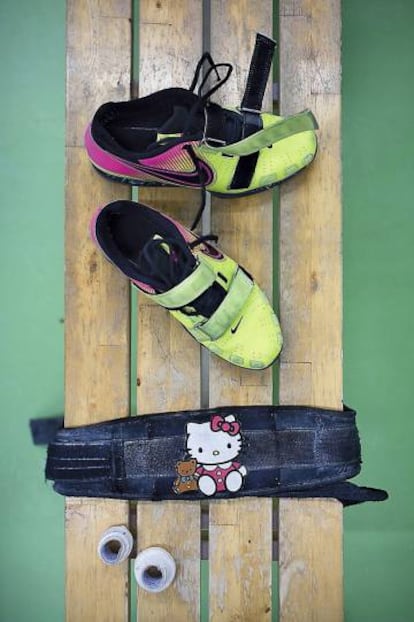
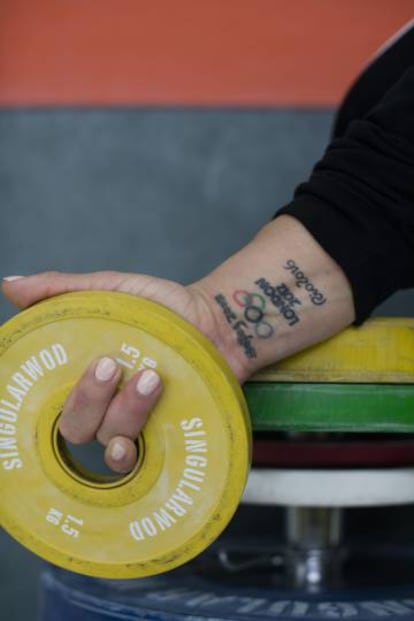
Valentín knows, however, that her career and income could have been very different – as could the state of Spanish weightlifting – had it not been for doping. Though she has not worked out the exact sum of money she missed out on, at a glance there is €94,000 for the gold in London to add to the €48,000 she has already received from her retrospective win in Beijing as well as the Olympic Sports Association (ADO) grants that should have come her way, amounting to a further €184,000, as in each Olympic Games, athletes’ grants correspond to how well they did in the previous Games. Valentín and the federation refer to the period when doping seriously compromised Valentín’s career as eight years “in the shadows,” years that coincided with the economic crisis and brutal spending cuts in Spain.
The Spanish government cut its annual budget on the sport from €1.2 million to €900,000, a fraction of what other national federations receive in public money. Kazakhstan, for example, pours €10 million into the sport every year. Like other states in the region where “strength” sports are a tradition, Kazakhstan considers weightlifting to be its signature sport. Money in these former Soviet bloc countries is no obstacle. In fact, the Weightlifting World Championships have been moved from Lima, Peru, to Ashgabat, Turkmenistan because of the money the Turkmenistan government is prepared to spend.
Given the environment she is competing in, Valentín’s achievements are quite extraordinary. “Lydia’s victory is a landmark because we’ve never been close to getting an Olympic medal before. She has blazed the trail and taken us out of obscurity,” says Constantino Iglesias, president of Spain’s Weightlifting Federation. The doping scandals, which mainly affected China and the former USSR countries, have had a positive knock-on effect for Spain. In the 2017 World Championships, which took place in Anaheim in the US, the International Weightlifting Federation banned nine teams for a year – Russia, Kazakhstan, Azerbaijan, Ukraine, Belarus, China, Armenia, Turkey and Moldavia . This opened up the field for athletes such as Valentín, who went on to win. No mean feat. “They are very rich countries where doping in sport is institutionalized,” says Iglesias. “Suspending them was a very brave decision.”
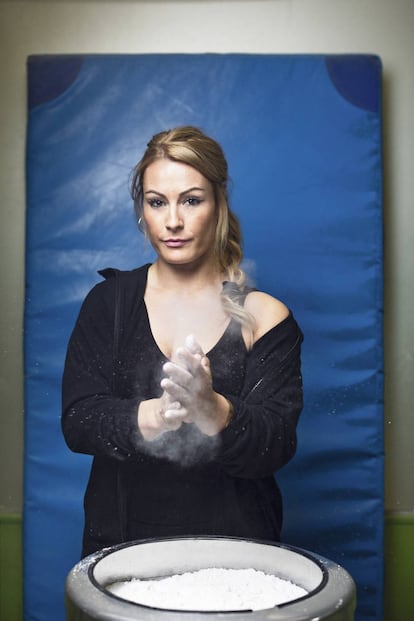
With respect to the 2020 Tokyo Olympics, countries like Spain will be able to send up to eight weightlifters while countries where more than 20 athletes have tested positive for doping since Beijing will only be allowed to send two. This includes Kazakhstan, Belarus and Russia, which was disqualified along with Bulgaria in Rio 2016. Meanwhile, the teams who have had between 10 and 20 have tested positive can send four athletes. “One thing is a single athlete testing positive and another is a number of athletes being caught at it from the same federation,” says Estefanía Juan. “It’s completely different and you have to impose sanctions on the whole country.” Juan believes the International Weightlifting Federation should have adopted these measures earlier. In fact, she claims their introduction is driven by the fear that the sport will be banned altogether from the 2024 Olympics in Paris, which would be a major blow for a discipline that has been included in the Olympics since 1896 for men and since 2000 for women. COE President Alejandro Blanco, however, maintains that there is no evidence to back this claim.
“All my life I have competed against people who don’t play by the rules,” says Valentín. “I suspected as much in Beijing and London. How? Because you can tell by those who tested positive previously… I worry that the cheats won’t get caught or it will take a long time to catch them.” In Rio, Valentín was beaten by North Korea’s Rim Jong-sim who took gold and Darya Naumava, an athlete from Belarus, who picked up silver. Both these countries are under suspicion for doping. Asked if she thought irregularities would be revealed in the next few years, Lydia hesitates. “Everyone is innocent until proved otherwise,” she says. “I have never tested positive. I wouldn’t like to be accused. And so I can’t accuse others. They passed their tests the same as I did.”
But suspicion is inevitable in a sport where the number of doping cases between Beijing and London has reached 49, and this, in turn, affects the atmosphere at tournaments. “There is more dirty weightlifting than clean,” says Valentín. “There’s two kinds; the one that respects the rules and the one that is a performance involving people who shoot to the top, breaking records that aren’t real and fooling the spectators, the coaches and their rivals. That kind of weightlifting is very powerful and that is why it’s so hard to fight it. Talking of power, what do you do to Russia? What do you do about state doping?”
She totally believes in herself. Her mind is her biggest asset Admirer Irene Martínez
Valentín is still amazed that the cheating in Beijing and London has come to light. “Why did it happen? We don’t know,” she says. COE President Alejandro Blanco believes it’s due to more sophisticated detection techniques. “The technology is different,” he says. “You can now detect substances that slipped under the radar some years ago. And that’s very important because it sends a message to athletes tempted to cheat that they might get off with it now, but 10 years down the line, they could be in for a surprise.”
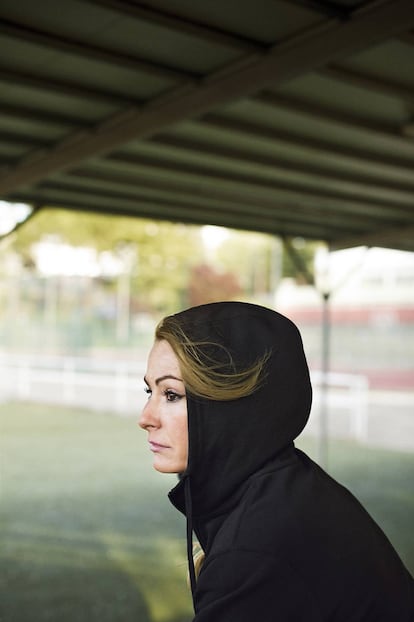
But Lydia is not entirely convinced by this explanation. “There were people testing positive for growth hormones and that is something that has always shown up on tests. Have you seen the movie Icarus? Watch it and you’ll understand.” The film, which won this year’s Oscar for Best Documentary, centers on Grigory Rodchenkov, the former director of Russia’s national anti-doping laboratory who now lives in the US under the country’s Witness Protection Program. Rodchenkov fled Russia after blowing the whistle on the Russian doping scheme at the Sochi 2014 Winter Olympics, which he helped to mastermind. In Sochi, Russia won 33 medals, 13 of which were gold, but as many as half of the athletes are under suspicion. The former KGB, now known as the FSB, allegedly substituted contaminated urine samples for clean ones to get through the controls. The operation was, according to Rodchenkov, ordered by the country’s president, Vladimir Putin together with the former sports minister and current deputy prime minister, Vitaly Mutko. Rodchenkov maintains that Russia has been cheating since 1968. With the collapse of the Soviet Union, suspect practices were continued in the countries that emerged from the ashes. A number of them are now on the blacklist of international weightlifting.
But despite all the murky goings on, Lydia prefers not to think of her retirement from the sport. She does concede, however, that Tokyo will be her last Olympics. Beyond that, she sees herself opening a gym and designing sportswear. She has already made a start with a line of sweatshirts adorned with heart prints, which, along with Hello Kitty, are her signature during competitions. “I’m particularly interested in fashion,” she says. “I think I’m extremely creative and I also think there’s a demand for it in the High Performance Center where there are more girls than boys. Things that are pink and feminine interest us a lot. In the future, I would love to dress the team and the clubs so that the girls are able to express themselves, and so that they can choose between unisex and a feminine look.”
But until the time comes to park her barbells, Valentín is still aiming for gold, first at the Mediterranean Games that will take place in Tarragona at the end of June. And then at the World Championships in Turkmenistan where she will defend her title, not only as World Champion but also as the world’s top female weightlifter, an honor bestowed upon her by the International Federation of Weightlifting. “It’s like the Ballon d'Or in soccer,” says Constantino Iglesias, who went with Valentín in May to pick up the award in Georgia. “I feel very proud that weightlifting is getting spoken about thanks to me,” says Valentín. “How do you focus again when you’ve won everything? Well you do, because you like training and competing and because you want more. My philosophy is to enjoy, keep working and stay focused. It’s very important to have a clear head. If we compete under equal conditions, the person who is in the best mental state will win.”
English version by Heather Galloway.
